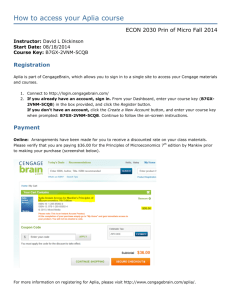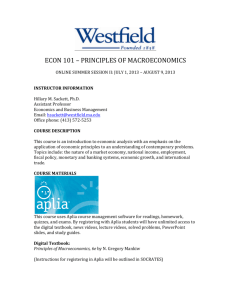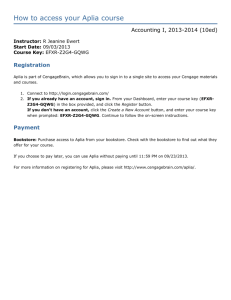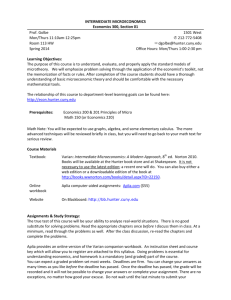Principles of Microeconomics (ECO 200) Hunter College Fall 2015
advertisement
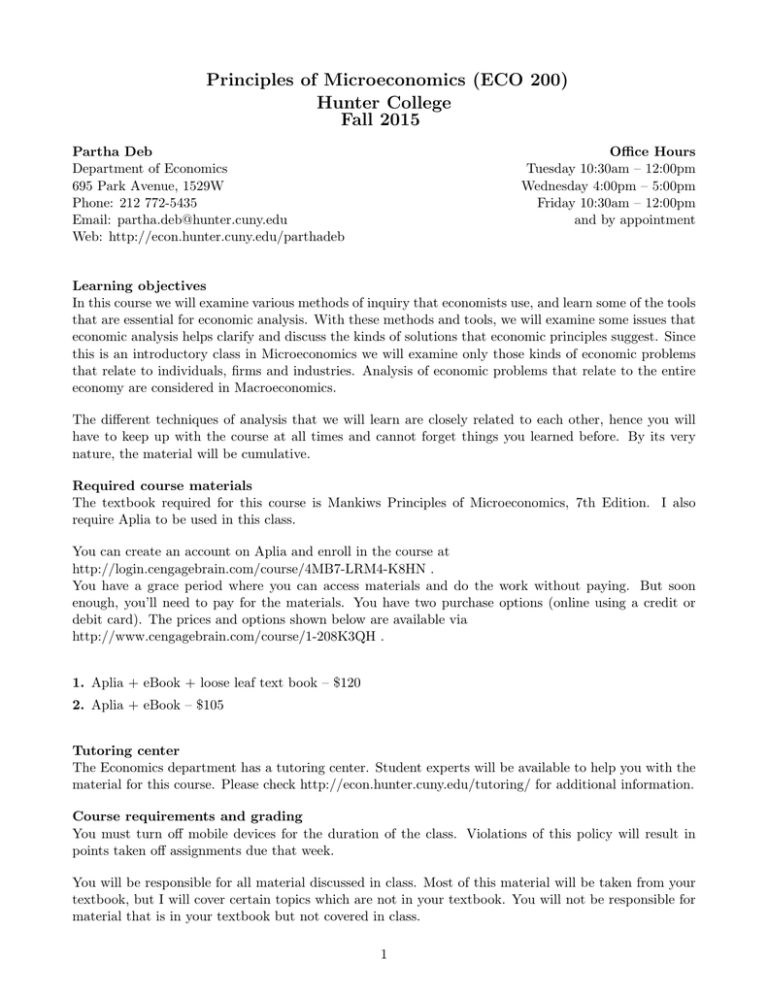
Principles of Microeconomics (ECO 200) Hunter College Fall 2015 Partha Deb Department of Economics 695 Park Avenue, 1529W Phone: 212 772-5435 Email: partha.deb@hunter.cuny.edu Web: http://econ.hunter.cuny.edu/parthadeb Office Hours Tuesday 10:30am – 12:00pm Wednesday 4:00pm – 5:00pm Friday 10:30am – 12:00pm and by appointment Learning objectives In this course we will examine various methods of inquiry that economists use, and learn some of the tools that are essential for economic analysis. With these methods and tools, we will examine some issues that economic analysis helps clarify and discuss the kinds of solutions that economic principles suggest. Since this is an introductory class in Microeconomics we will examine only those kinds of economic problems that relate to individuals, firms and industries. Analysis of economic problems that relate to the entire economy are considered in Macroeconomics. The different techniques of analysis that we will learn are closely related to each other, hence you will have to keep up with the course at all times and cannot forget things you learned before. By its very nature, the material will be cumulative. Required course materials The textbook required for this course is Mankiws Principles of Microeconomics, 7th Edition. I also require Aplia to be used in this class. You can create an account on Aplia and enroll in the course at http://login.cengagebrain.com/course/4MB7-LRM4-K8HN . You have a grace period where you can access materials and do the work without paying. But soon enough, you’ll need to pay for the materials. You have two purchase options (online using a credit or debit card). The prices and options shown below are available via http://www.cengagebrain.com/course/1-208K3QH . 1. Aplia + eBook + loose leaf text book – $120 2. Aplia + eBook – $105 Tutoring center The Economics department has a tutoring center. Student experts will be available to help you with the material for this course. Please check http://econ.hunter.cuny.edu/tutoring/ for additional information. Course requirements and grading You must turn off mobile devices for the duration of the class. Violations of this policy will result in points taken off assignments due that week. You will be responsible for all material discussed in class. Most of this material will be taken from your textbook, but I will cover certain topics which are not in your textbook. You will not be responsible for material that is in your textbook but not covered in class. 1 Assignments Each week I will post a combination of practice and graded problems at Aplia. The practice problems are optional and are not counted as part of your assignment grade. But they are very good examples for the graded problems and exams so I urge you to do them. You can see correct answers to and explanations for the practice problems immediately after you have attempted them. The deadline for turning in the graded problems each week is Sunday at 11pm. This is a firm due date. The time used to record the submission is Aplia’s, not what is being shown on your computer or watch. Therefore, and to allow for computer glitches, I strongly recommend that you do not wait until the last few minutes to submit your graded assignments. The Aplia system will not allow me to consider any excuses. Exams You will have two mid-term exams and a cumulative final exam. I will announce the date of the mid-term in class sufficiently prior to the exam. The final exam will be held on Tuesday 12/22/2015 11:30am – 1:30pm. Note this now as I do not take kindly to missed exams. See below for how I deal with them in terms of grading. Grading The assignments taken together will account for 30% of your course grade. Weekly assignments will have equal weight and the lowest assignment score will be dropped before the aggregate score is calculated. Each midterm will account for 20% of your grade and the final will account for 30% of your grade. No make up exams will be given. If you have a very good reason (according to me) for not being able to take an exam I will impute a score at the end of the semester based on your overall performance. If you miss an exam, you must talk to me about it as soon as possible. Academic dishonesty will not be tolerated. No dictionaries, cell phones, headphones, or PDAs of any kind are allowed during exams, nor is talking to other students, however briefly or for whatever reason Hunter College regards acts of academic dishonesty (e.g., plagiarism, cheating on examinations, obtaining unfair advantage, and falsification of records and official documents) as serious offenses against the values of intellectual honesty. The College is committed to enforcing the CUNY Policy of Academic Integrity and will pursue cases of academic dishonesty according to the Hunter College Academic Integrity Procedures. 2 Course outline The following outlines the chapters and sections in your textbook that you need to read. Most chapters need to be read completely even if only a few sections are listed. 9. Chapter 9: Application: International Trade 1. Chapter 1: Ten Principles of Economics a. How people make decisions b. How people interact a. The determinants of trade b. The winners and losers from trade c. The arguments for restricting trade 2. Chapter 2: Thinking Like an Economist a. b. c. d. The economist as scientist The economist as policy advisor Why economists disagree Appendix: Graphing 10. Chapter 10: Externalities a. Externalities and market inefficiency b. Private solutions to externalities c. Public policies towards externalities 3. Chapter 4: The Market Forces of Supply and Demand a. b. c. d. e. 11. Chapter 11: Public Goods and Common Resources Markets and Competition Demand Supply Supply and Demand Together How prices allocate resources a. The different kinds of goods b. Public goods c. Common resources 12. Chapter 13: The Costs of Production 4. Chapter 5: Elasticity and its Application a. b. c. d. a. The elasticity of demand b. The elasticity of supply c. Applications of supply, demand and elasticity What are costs? Production and costs The various measures of cost Costs in the short run and in the long run 13. Chapter 14: Firms in Competitive Markets 5. Chapter 6: Supply, Demand and Government Policies a. What is a competitive market? b. Profit maximization and the competitive firms supply curve c. The supply curve in a competitive market a. Controls on prices b. Taxes 6. Chapter 7: Consumers, Producers and the Efficiency of Markets 14. Chapter 15: Monopoly a. Why monopolies arise b. How monopolies make production and pricing decisions c. The welfare cost of monopoly d. Public policy towards monopolies a. Consumer Surplus b. Producer Surplus c. Market efficiency 7. Chapter 8: Application: The Costs of Taxation 15. Chapter 16: Monopolistic Competition a. The deadweight loss of taxation b. The determinants of the deadweight loss a. Between monopoly and perfect competition b. Competition with differentiated products Midterm Exam 1 Midterm Exam 2 8. Chapter 3: Interdependence and the Gains from Trade 16. Chapter 17: Oligopoly a. Markets with only a few sellers b. The economics of cooperation a. A parable for the modern economy b. The principle of comparative advantage c. Applications of comparative advantage Final Exam (Cumulative) 3

